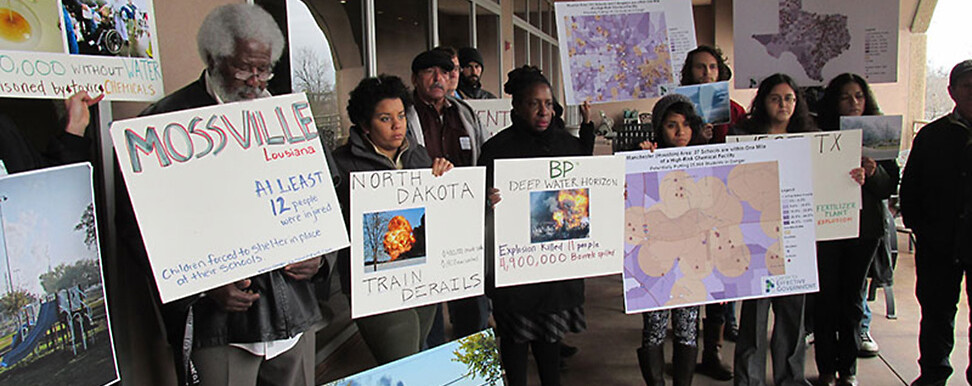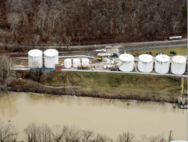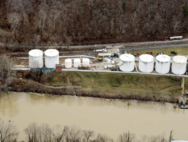

Affiliates
Share this page:
People Concerned About Chemical Safety
People Concerned About Chemical Safety (PCACS) is a community organization in the Kanawha Valley that has been active in community affairs for over 25 years. Dedicated to the protection of health and safety of all who reside, work, and study in the vicinity of chemical facilities, we promote environmental justice and chemical safety through education and advocacy.
Following the January 9th Elk River chemical leak, we successfully organized citizen action efforts to protect drinking water that led to the strongest piece of environmental legislation in West Virginia history. We successfully initiated a process to implement Chemical Safety Board recommendations outstanding from a 2008 explosion at the BayerCropScience-Institute, WV facility.
Related News
Environmental Groups Sue EPA Demanding Protections from Hazardous Chemicals
August 28, 2025
A coalition led by environmental justice organizations filed a suit against the U.S. Environmental Protection Agency today for refusing to issue long-overdue rules to prevent hazardous-substance discharges that threaten public health and contaminate waterways. Across the United States, more than 100,000 facilities make, store, or use hundreds of hazardous chemicals linked to reproductive, developmental, and neurological harm – including benzene, hydrogen sulfide, sulfuric acid, hydrogen cyanide, and hydrochloric acid. “For generations environmental justice communities have lived next to some of the most hazardous facilities in the country that threaten the bodies of water our families rely on to survive. Now more than ever we must prioritize creating safe and healthy places where all of our children can thrive and grow.” said Michele Roberts, National Coordinator of the Environmental Justice Health Alliance for Chemical Policy Reform. “The EPA’s do-nothing approach leaves us one incident away from a catastrophe.”
Read More
New EPA rule to reduce industrial air pollutants leaves out a majority-Black West Virginia community
April 14, 2024
Last week, Biden administration officials finalized a rule they said would significantly reduce cancer-causing air pollutants, lowering cancer risk and advancing environmental justice goals. But the move by the U.S. Environmental Protection Agency left out a Black West Virginia community yet again. While the rule will target facilities surrounding communities historically overburdened by toxic air pollution, it doesn’t cover the chemical production category that has disproportionately affected one of West Virginia’s only two majority-Black communities. “It’s actually a positive development, but it doesn’t fully address the issues in Institute,” said Maya Nye, a former Kanawha Valley resident and member of the Charleston-based People Concerned About Chemical Safety.
Read MoreUSEPA Rolls Out Rule to Address Worst-Case Chemical Disasters, Impacting Thousands of Facilities
March 21, 2024
The rule addresses a critical vulnerability in the protection of the country's waterways and communities. Thousands of facilities that manufacture, use and store some of the most dangerous chemicals brush up against waterways or are in flood-prone areas. The new policy comes after numerous disasters affecting drinking water supplies, wildlife habitats, and environmental justice communities that experience the brunt of extreme weather supercharged by climate change. “We are thankful that this administration is finally taking long overdue action to protect workers and communities against chemical disasters. Communities of color and the poor, who are experiencing the worst of the climate crisis, are also on the front lines of the fight against policies that permit billions of pounds of pollution and concentrate the most dangerous industries in our communities” said Michele Roberts, National Co-Coordinator of the Environmental Justice Health Alliance for Chemical Policy Reform (EJHA). “While we’re glad to see this rule taking steps in the right direction, we will continue to call on EPA to truly prevent disasters by transitioning away from inherently dangerous chemicals and processes as outlined in the Louisville Charter for Safer Chemicals.”
Read MoreIn toxic Ohio derailment, other Americans see echoes of their fights
March 19, 2023
The unusually high profile of the East Palestine derailment — which prompted the railroad to send a massive black plume into the air, went viral on social media and became a political flash point — drew national attention to federal rules governing toxic chemicals, railroad safety and chemical transport. While activists who talked to The Washington Post said heightened awareness of chemical risks is good, watching an emergency unfold can also be difficult. “Every time they happen, they remind you of the disasters that you’ve experienced,” said Maya Nye, a West Virginia activist and federal policy director at Coming Clean, a nonprofit organization that advocates for preventing chemical disasters. “It’s just yet another reminder of the protections that aren’t there that people in my community have been fighting for for so long,” Nye said. Some have also noted that the incident in East Palestine, a majority-White town of 4,700 people, drew more attention than those in their communities of color. In Houston, advocates’ frustration was compounded by the news that some of the toxic waste excavated in East Palestine would be trucked to a Southeast Texas facility. “We have become the dumping ground for the rest of the nation,” said Ana Parras, co-director of the Houston-based group Texas Environmental Justice Advocacy Services, which advocates for people living near rail tracks and chemical facilities. Her organization and others protested the movement of the derailment waste to Harris County, Tex.
Read MoreSafety advocates say EPA proposal not enough to protect vulnerable communities like Kanawha Valley from chemical disaster
October 23, 2022
Maya Nye felt the boom that changed her life from a mile away. Then a fire truck went down her one-way street announcing that a shelter-in-place order had taken effect and to shut all doors and windows. Nye, then 16, sheltered in place like she had been taught in school, but the duct tape she put up to cover the cracks around the door and windows didn’t work. The smell infiltrated her house. An explosion at the Institute chemical plant then owned by former French chemical company Rhône-Poulenc killed one worker and injured two others who were in a unit for the insecticide methomyl. It was Aug. 18, 1993 — nearly nine years after a leak of highly toxic methyl isocyanate from a Union Carbide pesticide plant in Bhopal, India, killed thousands of people and caused permanent disabilities or premature death for many thousands more. “My life was forever changed,” recalled Nye, who became a chemical safety advocate and is now federal policy director for Coming Clean, a chemical industry-focused environmental health nonprofit.
Read MoreAffiliates Share this page: |
What Is Environmental Justice? | Campaign for Healthier Solutions | Campaign for Healthier Solutions |
THE ENVIRONMENTAL JUSTICE HEALTH ALLIANCE IS IN STRATEGIC PARTNERSHIP WITH COMING CLEAN
info@comingcleaninc.org • (802) 251-0203 • EJHA – Coming Clean, 28 Vernon Street, Suite 434, Brattleboro, VT 05301
© 2025 Coming Clean Inc.




